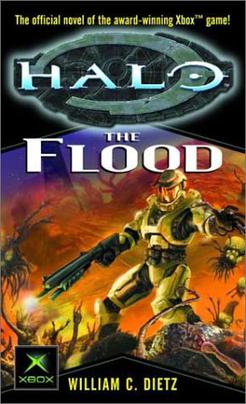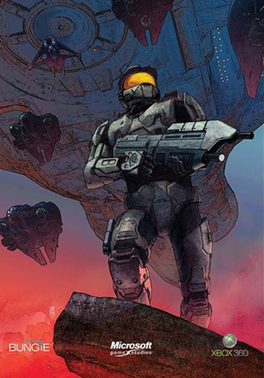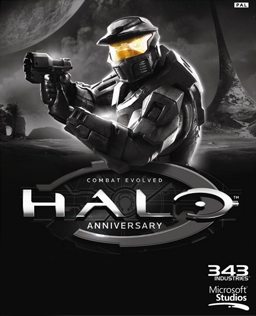
Halo: Combat Evolved is a 2001 first-person shooter video game developed by Bungie and published by Microsoft Game Studios for the Xbox. It was released as a launch game for Microsoft's Xbox video game console on November 15, 2001. The game was ported to Microsoft Windows and Mac OS X in 2003. It was later released as a downloadable Xbox Original for the Xbox 360. Halo is set in the twenty-sixth century, with the player assuming the role of the Master Chief, a cybernetically enhanced supersoldier. The Chief is accompanied by Cortana, an artificial intelligence. Players battle aliens as they attempt to uncover the secrets of the eponymous Halo, a ring-shaped artificial world.

Halo 2 is a 2004 first-person shooter game developed by Bungie and published by Microsoft Game Studios for the Xbox console. Halo 2 is the second installment in the Halo franchise and the sequel to 2001's critically acclaimed Halo: Combat Evolved. The game features new weapons, enemies, and vehicles, another player character, and shipped with online multiplayer via Microsoft's Xbox Live service. In Halo 2's story mode, the player assumes the roles of the human Master Chief and alien Arbiter in a 26th-century conflict between the United Nations Space Command, the genocidal Covenant, and later, the parasitic Flood.

Halo: The Flood is a military science fiction novel by William C. Dietz, based on the Halo series of video games and based specifically on the 2001 video game Halo: Combat Evolved, the first game in the series. The book was released in April 2003 and is the second Halo novel. Closely depicting the events of the game, The Flood begins with the escape of a human ship Pillar of Autumn from enemy aliens known as the Covenant. When the Pillar of Autumn unexpectedly discovers a massive artifact known as "Halo", the humans must square off against the Covenant and a second terrifying force in a desperate attempt to uncover Halo's secrets and stay alive. Though the book roughly follows the same events of the Xbox game, featuring identical dialogue, Dietz also describes events not seen by the game's protagonist, the super-soldier Master Chief.

The Flood is a fictional parasitic alien lifeform and one of the primary antagonists in the Halo multimedia franchise. First introduced in the 2001 video game Halo: Combat Evolved, it returns in later entries in the series such as Halo 2, Halo 3, and Halo Wars. The Flood is driven by a desire to infect any sentient life of sufficient size; Flood-infected creatures, also called Flood, in turn can infect other hosts. The parasite is depicted as such a threat that the ancient Forerunners constructed artificial ringworld superweapons known as Halos to contain it and, as a last resort, to kill all sentient life in the galaxy in an effort to stop the Flood's spread by starving it.

Cortana is a fictional artificially intelligent character in the Halo video game series. Voiced by Jen Taylor, she appears in Halo: Combat Evolved and its sequels, Halo 2, Halo 3, Halo 4, Halo 5: Guardians and Halo Infinite. She also briefly appears in the prequel Halo: Reach, as well as in several of the franchise's novels, comics, and merchandise. During gameplay, Cortana provides backstory and tactical information to the player, who often assumes the role of Master Chief Petty Officer John-117. In the story, she is instrumental in preventing the activation of the Halo installations, which would have destroyed all sentient life in the galaxy.

Halo 3 is a 2007 first-person shooter video game developed by Bungie for the Xbox 360 console. The third installment in the Halo franchise following Halo: Combat Evolved (2001) and Halo 2 (2004), the game's story centers on the interstellar war between 26th-century humanity, a collection of alien races known as the Covenant, and the alien parasite known as the Flood. The player assumes the role of the Master Chief, a cybernetically enhanced supersoldier, as he battles the Covenant and the Flood. In cooperative play, other human players assume the role of allied alien soldiers. The game features vehicles, weapons, and gameplay elements familiar and new to the series, as well as the addition of saved gameplay films, file sharing, and the Forge map editor—a utility which allows the player to perform modifications to multiplayer levels.

In the Halo universe, an Arbiter is a ceremonial, religious, and political rank bestowed upon Covenant Elites. In the 2004 video game Halo 2, the rank is given to a disgraced commander named Thel 'Vadam as a way to atone for his failures. Although the Arbiter is intended to die serving the Covenant leadership, the High Prophets, he survives his missions and the Prophets' subsequent betrayal of his kind. When he learns that the Prophets' plans would doom all sentient life in the galaxy, the Arbiter allies with the Covenant's enemies (humans) and stops the ringworld Halo from being activated. The Arbiter is a playable character in Halo 2 and its 2007 sequel Halo 3. The character also appears in Halo 5: Guardians and additional expanded universe material. A different Arbiter, Ripa 'Moramee appears in the 2009 real-time strategy game Halo Wars, which takes place 20 years before the events of the main trilogy.
Halo is a military science fiction video game series and media franchise, originally developed and created by Bungie and currently managed and developed by 343 Industries, part of Microsoft's Xbox Game Studios. The series launched in 2001 with the first-person shooter video game Halo: Combat Evolved and its tie-in novel, The Fall of Reach. The latest main game, Halo Infinite, was released in late 2021.

Jason Jones is an American video game developer and programmer who co-founded the video game studio Bungie with Alex Seropian in 1991. Jones began programming on Apple computers in high school, assembling a multiplayer game called Minotaur: The Labyrinths of Crete. While attending the University of Chicago, Jones met Seropian and the two formed a partnership to publish Minotaur.

Joseph Staten is an American writer best known for his work at video game studios Bungie, Microsoft Studios, and 343 Industries.
Certain Affinity is an American video game development studio based in Austin, Texas. It was founded in 2006 by Max Hoberman and a small number of other ex-Bungie employees and other industry veterans.

Halo: Uprising is a four-issue American comic book limited series set in the Halo universe. The series was written by Brian Michael Bendis, illustrated by Alex Maleev, and published by Marvel Comics. Uprising tells a story set between the ending of the 2004 video game Halo 2 and the beginning of its sequel, Halo 3, as Earth is under attack by a collective of alien races known as the Covenant. The series was intended to be released and concluded before Halo 3 shipped on September 25, 2007, but the final issue did not appear until April 2009.

The first-person shooter video game Halo 3 was the focus of an extensive marketing campaign which began with the game's developer, Bungie, announcing the game via a trailer at the Electronic Entertainment Expo in May 2006. Microsoft, the game's publisher, planned a five-pronged marketing strategy to maximize sales and to appeal to casual and hard-core gamers. Bungie produced trailers and video documentaries to promote the game, partnering with firms such as Digital Domain and Weta Workshop. Licensed products including action figures, toys, and Halo 3-branded soda were released in anticipation of the game; the franchise utilized more than forty licensees to promote the game, and the advertising campaign ultimately cost more than $40 million.

Halo 3: ODST is a 2009 first-person shooter game developed by Bungie and published by Microsoft Game Studios. The fifth installment in the Halo franchise as a side game, it was released on the Xbox 360 in September 2009. Players assume the roles of United Nations Space Command Marines, known as "Orbital Drop Shock Troopers" or ODSTs, during and after the events of Halo 2. In the game's campaign mode, players explore the ruined city of New Mombasa to discover what happened to their missing teammates in the midst of an alien invasion. In the "Firefight" multiplayer option, players battle increasingly difficult waves of enemies to score points and survive as long as possible; Halo 3's multiplayer is contained on a separate disc packaged with ODST.

Luke Michael Smith is an American writer. He was a staff member at the video game development company Bungie, and is a former video games journalist. Smith wrote for a college newspaper and weekly papers in Michigan before being hired as one of the first new freelance writers for Kotaku. At Kotaku, Smith developed his writing style but soon left the site for a staff position as 1Up.com's news editor. Smith made a name for himself at 1Up, particularly through an article he wrote focusing on problems with the game Halo 2.

Halo: Reach is a 2010 first-person shooter video game developed by Bungie and published by Microsoft Game Studios, originally for the Xbox 360. The sixth installment in the Halo series and a direct prequel to Halo: Combat Evolved, Reach was released worldwide in September 2010. The game takes place in the year 2552, where humanity is locked in a war with an alien theocracy known as the Covenant, which seeks to exterminate humanity. Players play as Noble Six, a member of an elite squad of supersoldiers, known as Noble Team, attempting to stage a defense of the human world known as Reach, which falls under Covenant attack. The game was the last in the series to be developed by Bungie.

343 Industries is an American video game developer located in Redmond, Washington, part of Xbox Game Studios. Headed by Pierre Hintze, the studio is responsible for the Halo series of military science fiction games, originally created and produced by Bungie, and is the developer of the Slipspace Engine. Named after the Halo character 343 Guilty Spark, the studio was established in 2007 after the departure of Bungie after the release of Halo 3.
Bungie, Inc. is an American video game company based in Bellevue, Washington, and a subsidiary of Sony Interactive Entertainment. The company was established in May 1991 by Alex Seropian, who later brought in programmer Jason Jones after publishing Jones's game Minotaur: The Labyrinths of Crete. Originally based in Chicago, Illinois, the company concentrated on Macintosh games during its early years and created two successful video game franchises called Marathon and Myth. An offshoot studio, Bungie West, produced Oni, published in 2001 and owned by Take-Two Interactive, which held a 19.9% ownership stake at the time.

Halo: Combat Evolved Anniversary is a 2011 first-person shooter video game developed by 343 Industries, Saber Interactive, and Certain Affinity. It is a remake of Halo: Combat Evolved (2001), developed by Bungie. Publisher Microsoft announced Anniversary alongside Halo 4 at the 2011 Electronic Entertainment Expo. It was released in November 2011, the 10th anniversary of the original Halo, for the Xbox 360 console, and re-released as part of Halo: The Master Chief Collection for the Xbox One in November 2014. A Windows version was released in March 2020.















